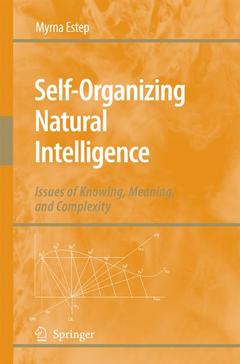Self-Organizing Natural Intelligence, 2006 Issues of Knowing, Meaning, and Complexity
Auteur : Estep Myrna

This book brings new scientific methods to intelligence research that is still under the influence of 19th century single causal theory and method. The author describes a rigorous and exhaustive classification of natural intelligence while demonstrating a more adequate scientific and mathematical approach than current statistical and psychometric approaches construct to shore up the out-dated and misused IQ hypothetical. The author demonstrates the superiority of a highly developed multidisciplinary-theory models view of intelligence.
Myrna Lynne Estep holds the B.A., M.S., and Ph.D. degrees from Indiana University, Bloomington, where she also taught and where much of the research for this book was originally done. She has also held faculty positions at the University of Zimbabwe; a branch of the University of Texas; and held various professional positions with the U.S. Government. She is the author of numerous scientific and technological papers, two books, co-editor of another, and has conducted studies in social and political theory affecting women, minorities, and the poor. Her biography appears in numerous reference books including The Directory of American Scholars; various editions of the Marquis Who's Who and Who’s Who in Science and Engineering. She was elected a member of the Honor Society of Phi Kappa Phi in 1992, and is an active researcher and writer in the behavioral sciences and artificial intelligence. Along with her husband, philosopher-scientist Richard Schoenig, she spends much of her time in West Texas and in the high San Juan Mountains of southwest Colorado.
Brings new scientific methods to intelligence research
Argues and shows evidence for three major categories of natural intelligence
Presents empirical evidence from numerous clinical studies
Presents a rigorous treatment and exhaustive classification of natural intelligence
Date de parution : 09-2014
Ouvrage de 359 p.
15.5x23.5 cm
Disponible chez l'éditeur (délai d'approvisionnement : 15 jours).
Prix indicatif 105,49 €
Ajouter au panierDate de parution : 10-2006
Ouvrage de 359 p.
15.5x23.5 cm



